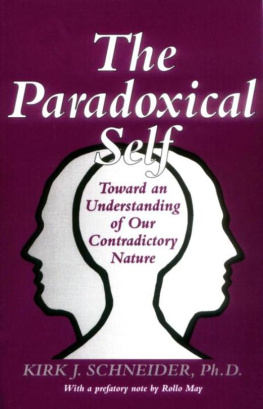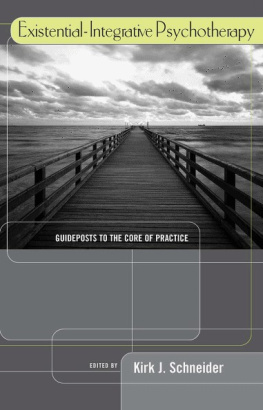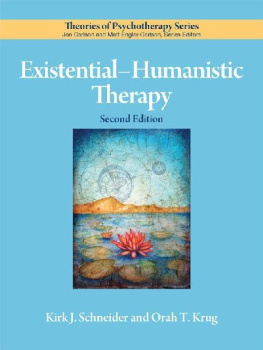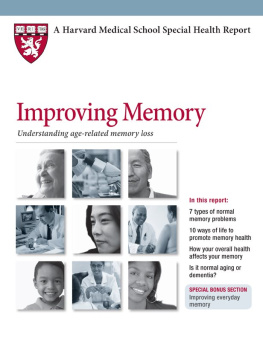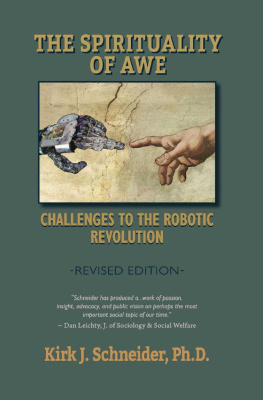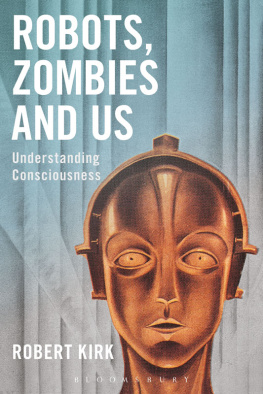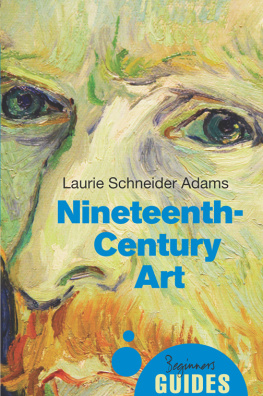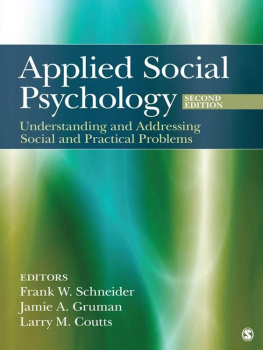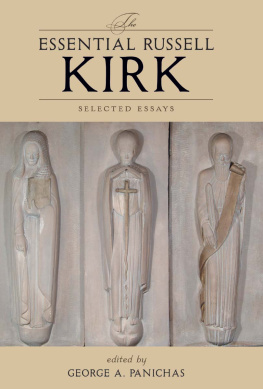Kirk J. Schneider - The Paradoxical Self: Toward an Understanding of Our Contradictory Nature
Here you can read online Kirk J. Schneider - The Paradoxical Self: Toward an Understanding of Our Contradictory Nature full text of the book (entire story) in english for free. Download pdf and epub, get meaning, cover and reviews about this ebook. year: 2020, publisher: amazon, genre: Romance novel. Description of the work, (preface) as well as reviews are available. Best literature library LitArk.com created for fans of good reading and offers a wide selection of genres:
Romance novel
Science fiction
Adventure
Detective
Science
History
Home and family
Prose
Art
Politics
Computer
Non-fiction
Religion
Business
Children
Humor
Choose a favorite category and find really read worthwhile books. Enjoy immersion in the world of imagination, feel the emotions of the characters or learn something new for yourself, make an fascinating discovery.
- Book:The Paradoxical Self: Toward an Understanding of Our Contradictory Nature
- Author:
- Publisher:amazon
- Genre:
- Year:2020
- Rating:5 / 5
- Favourites:Add to favourites
- Your mark:
- 100
- 1
- 2
- 3
- 4
- 5
The Paradoxical Self: Toward an Understanding of Our Contradictory Nature: summary, description and annotation
We offer to read an annotation, description, summary or preface (depends on what the author of the book "The Paradoxical Self: Toward an Understanding of Our Contradictory Nature" wrote himself). If you haven't found the necessary information about the book — write in the comments, we will try to find it.
The Paradoxical Self: Toward an Understanding of Our Contradictory Nature — read online for free the complete book (whole text) full work
Below is the text of the book, divided by pages. System saving the place of the last page read, allows you to conveniently read the book "The Paradoxical Self: Toward an Understanding of Our Contradictory Nature" online for free, without having to search again every time where you left off. Put a bookmark, and you can go to the page where you finished reading at any time.
Font size:
Interval:
Bookmark:

The Paradoxical Self
The Paradoxical Self Toward an Understanding of Our Contradictory Nature
Kirk J. Schneider, Ph.D.
With a prefatory note by Rollo May
Humanity Books an imprint of Prometheus Books 59 John Glenn Drive, Amherst, New York 14228-2197
Published 1999 by Humanity Books, an imprint of Prometheus Books The Paradoxical Self. Toward an Understanding of Our Con- tradictory Nature. Copyright ? 1990, 1999 Kirk J. Schneider. All rights reserved. No part of this publication may be repro- duced, stored in a retrieval system, or transmitted in any form or by any means, electronic, mechanical, photocopying, record- ing, or otherwise, without prior written permission of the pub- lisher, except in the case of brief quotations embodied in critical articles and reviews. Inquiries should be addressed to Humanity Books, 59 John Glenn Drive, Amherst, New York 14228-2197. VOICE: 716-691-0133, ext. 207. FAX: 716-564-2711. 0302010099 54321
Library of Congress Cataloging-in-Publication Data Schneider, Kirk J. The paradoxical self : toward an understanding of our contradictory nature / Kirk J. Schneider ; with a prefatory note by Rollo May ; and a new preface by the author. p. cm. Originally published: New York : Insight Books, 1990. Includes bibliographical references and index. ISBN 1-57392-636-1 (pbk. : alk. paper) 1. Paradox. 2. Self. 3. Psychology, Pathological. 4. Existential psychology. I. Title.
RC455.4.P35S34 1999 155.2-dc21 99-045897 CIP Printed in the United States of America on acid-free paper
TO MY PARENTS AND TO THE MEMORY OF DR. MURRAY H. SCHNEIDER, WHOSE IMPACT ON A FEW HAS MEANT SO MUCH
PREFATORY NOTE
The distinguishing virtue of Kirk Schneider's book is that the author refuses both the emptiness of shallow optimism and the hangdog attitude of pessimism. He does this by means of the paradox.
This is the paradox of life about which Paul Tillich, Kierkegaard, Nietzsche, and others talk, but which in our age of pseudoprosperity has been forgotten. Schneider argues that genuine joy of life and creativity come out of this polarity. He values the paradox which profound thinkers have always pointed out. He has great company consisting of Kierkegaard, Tillich, Ernest Becker, and many others down through history.
Though this is not the kind of book which Kierke-gaard describes as good for "perusing during one's af-ternoon nap," it is a book which calls us back to the fundamentals of life and psychology. It reminds one of the phrase Tillich believed was fundamental, namely "living in spite of." The Paradoxical Self will especially help psychology to get back to its great calling again.
ROLLO MAY
PREFACE TO THE PAPERBACK EDITION
In the ten years since this book was published, momentous changes have occurred in the world: the collapse of the Soviet Union; mass carnage in the Gulf War; a provisional (though volatile) peace in the Middle East; anarchy in Haiti and Somalia; population explosions in Africa; ethnic cleansing in Bosnia; and in our own country, the rise of the "information highway," militia movements, and youth crime.
Every day, moreover, there are dramatic new develop-ments in healthcare and medicine. Designer drugs are poised to vanquish troublesome memories; gene therapies are set to eradicate birth defects; and computerization is girded to rad-ically alter friendship, love, and knowledge.
Where will all these changes lead? What kind of a cen-tury are we headed toward? The answer, of course, is unknowable. But one point strikes clear. We are still a world suspended between constraint-reserve, scarcity, vulnerabil-ity-and expanse-exuberance, abundance, and grandeur; between our smallness and our greatness. While some of us recognize the beauty of this suspension, the rich and para-doxical potential it offers, many of us cannot fathom this beauty and cling desperately to the extremes. The extremes offer easy answers, quick solutions but-as events such as the above suggest-extremes almost invariably fail.
Today, I am more convinced than ever about the saliency of the concepts addressed in this book (see my volume with Rollo May, The Psychology of Existence: An Integrative, Clinical Perspective, 1995). More than ever before, I realize, constric-tion, expansion, and centering are time-honored human dimensions, continually enlivening us, supporting us, chal-lenging us. A friend of mine who is steeped in Chinese phi-losophy-Dr. Benjamin Tong-calls The Paradoxical Self a very Taoist book. The juxtapostion of yin (diminutive-recep-tive qualities) and yang (bold-adventurous) qualities, and the concept of effortless effort are indeed parallel to my outlook. To be is to partake in the ebb and flow of existence, to recog-nize that we are "no-thing," and thereby "everything." But this everything is quintessentially human, not god-like. It is everything we are-angry, sad, exalted, fearful. It is neither passionless nor frenetic. But it is any one of these (and other possible) states. The key here is our presence to given states, our ability to discern their relative value, and our recognition that they will someday become new states, new values.
Evil is fixation, Martin Buber declared; health is elastic-ity (see Good and Evil, 1953). This notion is reflected in every moment of our lives-our heartbeat, our breathing, our mus-culature, our careers and relationships. Even the universe is characterized by elasticity-contraction and expansion, wave and particle, mass and energy, creation and destruction.
Today we stand at the threshold of a new consciousness, more aware of holism, multi-culturalism, and co-existing worldviews. We are more aware of the benefits of holding con-trariety in our lives; less daunted by otherness. But as Tillich prophesied, even "with numerous groups of liberated people," there will still be "new and sharper paradoxes, new tensions, and more painful disharmonies" (see p. 180 in this volume). For psychologist-historian Brewster Smith, our "troubles" con-tinue to waver between expansion and what he terms "deple-tion" (see the American Psychologist, 1994, 49, (5), 405-411). On the expansion side, Smith cites the cult of selfish individ-ualism, capitalist materialism, and postmodern anarchism. On the depletion side, he refers to the sense of emptiness, frag-mentation, and cynicism to which these former conditions have led. In terms relevant to this volume, he recognizes the interplay between deprivation and overload, rigidity and aim-lessness-and the growing catastrophe that it portends.
Our greatest challenge today (and I think Smith would concur) is to couple conviction with doubt. By conviction, I mean some pragmatically developed faith, trust, or centered-ness; and by doubt I mean openness to the ongoing change-ability, mystery, and fallibility of the conviction. The stakes in this challenge-the challenge of a "fluid center" (Schneider, in press)-are both high and wide-ranging. Consider, for exam-ple, what a lack of conviction portends for our world: growing hopelessness, valuelessness, and a continued reliance on the expedient. A lack of doubt, on the other hand, means a per-petuation of the dogma, arrogance, and narrowness that leads back to convictionlessness. And so the cycle goes.
The present volume, I have realized in recent years, is my answer to the aforementioned dilemma. By drawing my the-sis from the life-world-from pretheoretical description and pregnant pauses-I have synthesized what many other exis-tential-humanistic observers have put in a variety of ways: that conviction and doubt, structure and groundlessness, and smallness and greatness are integral human modalities, and that if we don't respect these modalities we may achieve many things, e.g., order, revolution, intellectual and physi-cal prowess, but in the end, we forfeit wisdom.
Next pageFont size:
Interval:
Bookmark:
Similar books «The Paradoxical Self: Toward an Understanding of Our Contradictory Nature»
Look at similar books to The Paradoxical Self: Toward an Understanding of Our Contradictory Nature. We have selected literature similar in name and meaning in the hope of providing readers with more options to find new, interesting, not yet read works.
Discussion, reviews of the book The Paradoxical Self: Toward an Understanding of Our Contradictory Nature and just readers' own opinions. Leave your comments, write what you think about the work, its meaning or the main characters. Specify what exactly you liked and what you didn't like, and why you think so.

